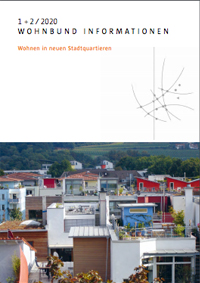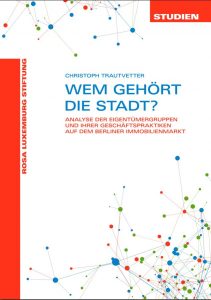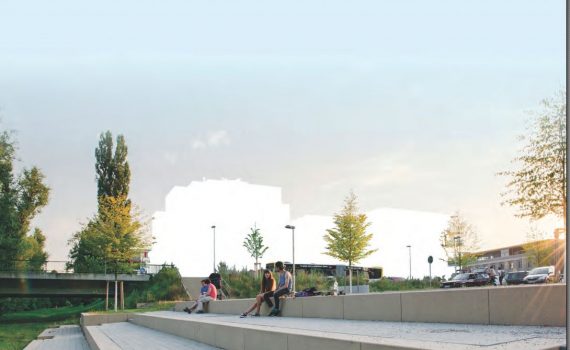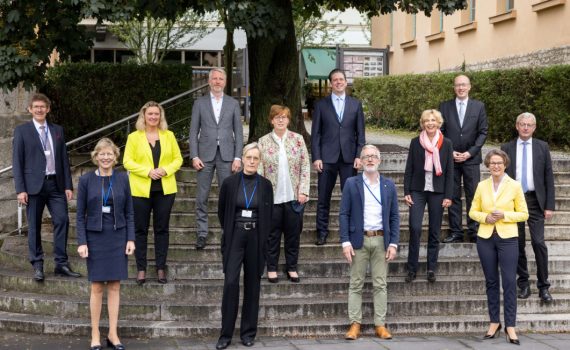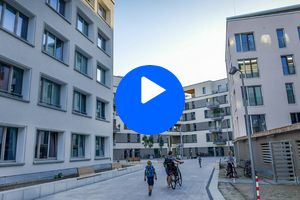The housing shortage is an immense social problem in many large cities and conurbations. At the same time, the building sector has been failing to meet its environmental and climate targets for years. In a recent position paper, the Federal Environment Agency (UBA) and the Commission for Sustainable Building at the UBA (KNBau) have examined how more affordable housing can be created without unnecessarily harming the environment and health. According to this paper, the most important factor for more environmental protection in housing construction is that the existing building stock is preserved wherever possible or is sensibly converted and repurposed. This is the easiest way to avoid climate emissions and unnecessarily high consumption of raw materials. Today, UBA President Prof. Dr. Dirk Messner presented KNBau's proposals to Federal Minister of Building Klara Geywitz and Federal Minister of the Environment Steffi Lemke in Berlin.
Kategorie für Blog: Housing policy
 The Federal Ministry of Transport, Building and Urban Affairs is supporting the climate-friendly construction of new buildings with a new funding programme that will start on 1 March 2023. For the first time, the entire life cycle of a building will be considered - from construction to operation to potential deconstruction in the distant future. The buildings are characterised by low greenhouse gas emissions in the life cycle, high energy efficiency, low operating costs and a high proportion of renewable energies for the generation of heat and electricity. This funding thus makes a contribution to climate protection and to meeting national climate targets.
The Federal Ministry of Transport, Building and Urban Affairs is supporting the climate-friendly construction of new buildings with a new funding programme that will start on 1 March 2023. For the first time, the entire life cycle of a building will be considered - from construction to operation to potential deconstruction in the distant future. The buildings are characterised by low greenhouse gas emissions in the life cycle, high energy efficiency, low operating costs and a high proportion of renewable energies for the generation of heat and electricity. This funding thus makes a contribution to climate protection and to meeting national climate targets.
Adjusted for inflation, construction volume will decline in 2022 - Price development and rising interest rates will continue to have a severe impact on the construction industry in the years to come - New residential construction will slump more than the overall construction volume - Policymakers will have to change their strategy in order to achieve their goals for the creation of new housing and energy-efficient building renovation in the medium term
It was only on 16 March 2022 that the Federal Cabinet approved the 2022 budget, the key figures until 2026 and thus also the record sum of 14.5 billion euros for social housing construction until 2026. On 18 March 2022, Federal Minister for Building Klara Geywitz signed the administrative agreement on climate-friendly social housing in the programme year 2022. This must now be countersigned by the Länder.
Statement by Klara Geywitz on the 2022 budget and the key figures of the financial planning until 2026 The draft budget for 2022 and the key figures of the financial planning up to 2026 provide for a total of 14.5 billion euros in programme funds for social housing. This will support the construction of 100,000 social housing units per year. That is more than three times the original financial planning, which had earmarked four billion euros by 2025. The 2022 budget will lay the foundation for planning with two billion euros.
 After a significant decline in the previous year, greenhouse gas emissions in Germany are on the rise again. Thus, around 762 million tonnes of greenhouse gases were released in 2021 - a good 33 million tonnes or 4.5 percent more than in 2020. Overall, emissions in Germany have thus fallen by 38.7 percent since 1990. The increase in the last year is particularly noticeable in the energy sector: This shows an increase of 27 million tonnes CO2-equivalents, as increased demand for electricity, lower electricity generation from renewable energies and the higher gas price led to increased use of coal for electricity generation. Electricity generation from renewables fell by seven per cent, mainly due to poor wind conditions. In the transport and building sectors, emissions were above the annual ceilings set by the Federal Climate Protection Act. This is shown by the latest calculations of the Federal Environment Agency (UBA), which are based on the specifications of the Federal Climate Protection Act and the EU-Renewable Energy Directive (RED) were presented today.
After a significant decline in the previous year, greenhouse gas emissions in Germany are on the rise again. Thus, around 762 million tonnes of greenhouse gases were released in 2021 - a good 33 million tonnes or 4.5 percent more than in 2020. Overall, emissions in Germany have thus fallen by 38.7 percent since 1990. The increase in the last year is particularly noticeable in the energy sector: This shows an increase of 27 million tonnes CO2-equivalents, as increased demand for electricity, lower electricity generation from renewable energies and the higher gas price led to increased use of coal for electricity generation. Electricity generation from renewables fell by seven per cent, mainly due to poor wind conditions. In the transport and building sectors, emissions were above the annual ceilings set by the Federal Climate Protection Act. This is shown by the latest calculations of the Federal Environment Agency (UBA), which are based on the specifications of the Federal Climate Protection Act and the EU-Renewable Energy Directive (RED) were presented today.
 The new National Progress Report on the Implementation of the New Urban Agenda shows the state of sustainability in urban development in German municipalities. The report was prepared by the German Institute of Urban Affairs on behalf of the Federal Institute for Research on Building, Urban Affairs and Spatial Development (BBSR).
The new National Progress Report on the Implementation of the New Urban Agenda shows the state of sustainability in urban development in German municipalities. The report was prepared by the German Institute of Urban Affairs on behalf of the Federal Institute for Research on Building, Urban Affairs and Spatial Development (BBSR).
 To live up to its climate change pledge under the Paris Agreement, the European Union must ensure that all 250 million existing buildings, as well as all new buildings in the EU, produce near-zero greenhouse gas emissions. In a new report, European national academies of science, through their association EASAC, call for far-reaching policy action. "Policies have long focused on creating energy-efficient buildings that require less heating and air conditioning or generate renewable energy on site. However, the energy used to operate buildings is only part of the story. We need to broaden the scope and look at emissions from building materials and methods - both for new buildings and for building refurbishment," says William Gillett, Director of EASAC's Energy Programme.
To live up to its climate change pledge under the Paris Agreement, the European Union must ensure that all 250 million existing buildings, as well as all new buildings in the EU, produce near-zero greenhouse gas emissions. In a new report, European national academies of science, through their association EASAC, call for far-reaching policy action. "Policies have long focused on creating energy-efficient buildings that require less heating and air conditioning or generate renewable energy on site. However, the energy used to operate buildings is only part of the story. We need to broaden the scope and look at emissions from building materials and methods - both for new buildings and for building refurbishment," says William Gillett, Director of EASAC's Energy Programme.
Building culture is becoming a recognised goal in the real estate industry: with support from the real estate and housing industry, the Institute for Corporate Governance in the German Real Estate Industry (ICG) and the Federal Foundation for Building Culture initiated and developed the Code for building culturea voluntary commitment for the responsible performance of tasks by companies in the real estate industry.
On 1 February 2021, the amendment to the Bavarian Building Code came into force. In the future, the building material wood can be used in all building classes. The legal changes make building in Bavaria easier and faster, more space-saving and more cost-effective.
 A broad alliance of actors from civil society, science, industry and practice is calling on the German government to promote the climate-friendly construction, maintenance and demolition of buildings. Up to now, only the use phase of buildings has been taken into account in state subsidies for buildings and in the Building Energy Act. There is a complete lack of specifications and consideration of the climate impact of building materials and the construction and disposal of buildings - despite the fact that the construction sector, with its upstream and downstream processes, contributes around 8 percent to German greenhouse gas emissions.
A broad alliance of actors from civil society, science, industry and practice is calling on the German government to promote the climate-friendly construction, maintenance and demolition of buildings. Up to now, only the use phase of buildings has been taken into account in state subsidies for buildings and in the Building Energy Act. There is a complete lack of specifications and consideration of the climate impact of building materials and the construction and disposal of buildings - despite the fact that the construction sector, with its upstream and downstream processes, contributes around 8 percent to German greenhouse gas emissions.
 On the occasion of the meeting of EU Ministers for Urban Development and Territorial Cohesion on the "New Leipzig Charter", Daniela Wagner, spokesperson for urban development for Alliance 90/The Greens in the German Bundestag, explains:
We welcome the "New Leipzig Charter". Without the transformative power of cities and the ideas and drive of their residents, we will not be able to overcome the challenges of the climate crisis. Nevertheless, the Charter contains significant gaps. The guiding principle of the resilient city is missing. The development of robust and resilient cities is important in order to better assess risks and recognise and prevent dangers in good time. The guiding principle of the healthy city is also not mentioned - despite the heatwaves caused by the climate crisis, a never-ending stream of air pollutants from fossil fuelled combustion engines and the current challenge of a global pandemic.
On the occasion of the meeting of EU Ministers for Urban Development and Territorial Cohesion on the "New Leipzig Charter", Daniela Wagner, spokesperson for urban development for Alliance 90/The Greens in the German Bundestag, explains:
We welcome the "New Leipzig Charter". Without the transformative power of cities and the ideas and drive of their residents, we will not be able to overcome the challenges of the climate crisis. Nevertheless, the Charter contains significant gaps. The guiding principle of the resilient city is missing. The development of robust and resilient cities is important in order to better assess risks and recognise and prevent dangers in good time. The guiding principle of the healthy city is also not mentioned - despite the heatwaves caused by the climate crisis, a never-ending stream of air pollutants from fossil fuelled combustion engines and the current challenge of a global pandemic.
 The Institute for Urban Planning and Social Research WEEBER+PARTNER (Stuttgart) examined 16 case studies and interviewed responsible persons in municipal, cooperative and private housing companies. The projects are characterized by a wide range of planning and construction approaches. According to the study, social diversity requires structural diversity: Rental, social and owner-occupied apartments of different sizes and with diverse layouts were created in the new housing quarters. They are socially mixed - even within buildings - with the respective proportions in the neighbourhood being derived from local requirements. The new quarters also offer space for communal forms of living, for example for older people and those in need of care. And they are characterised by an attractively designed and green residential environment. Concept awards promote the planning and implementation of such projects: Through them, plots of land are not allocated according to the highest price, but for the best concept.
The Institute for Urban Planning and Social Research WEEBER+PARTNER (Stuttgart) examined 16 case studies and interviewed responsible persons in municipal, cooperative and private housing companies. The projects are characterized by a wide range of planning and construction approaches. According to the study, social diversity requires structural diversity: Rental, social and owner-occupied apartments of different sizes and with diverse layouts were created in the new housing quarters. They are socially mixed - even within buildings - with the respective proportions in the neighbourhood being derived from local requirements. The new quarters also offer space for communal forms of living, for example for older people and those in need of care. And they are characterised by an attractively designed and green residential environment. Concept awards promote the planning and implementation of such projects: Through them, plots of land are not allocated according to the highest price, but for the best concept.
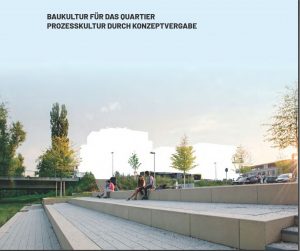 Conceptual procedures are increasingly establishing themselves as a further instrument of municipal land policy for locations with development potential. Here, the property is not allocated according to the highest price, but according to the concept that promises the most sustainable approaches to the further development of the neighbourhood. In this way, the procedures offer municipalities approaches to solving two current and urgent problems: the need for high-quality urban development and affordable housing.
Conceptual procedures are increasingly establishing themselves as a further instrument of municipal land policy for locations with development potential. Here, the property is not allocated according to the highest price, but according to the concept that promises the most sustainable approaches to the further development of the neighbourhood. In this way, the procedures offer municipalities approaches to solving two current and urgent problems: the need for high-quality urban development and affordable housing.
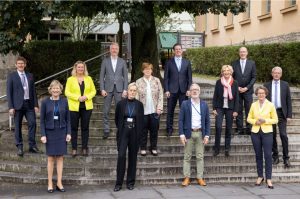 At their meeting in Weimar on 24 and 25 September, the construction ministers of the federal states adopted resolutions on social housing, the use of ecological building materials and the digitalisation of the building permit process, among other things.
The EU's plan to become involved in the area of public housing promotion as part of the new "InvestEU" fund was criticised. The federal government was therefore called upon to advocate a modification of the programme so that subsidies are only granted if the provisions of regional, national or federal funding regimes are observed, in particular if rent and occupancy restrictions are stipulated. The Chairman of the Conference of Building Ministers, Thuringia's Infrastructure Minister Benjamin-Immanuel Hoff, said: "Creating affordable housing in Germany remains an important task. The federal government must continue to provide at least the same level of funding. In order to make faster progress, we need more money in the system. The EU's commitment is therefore to be welcomed in principle. But we must ensure that the funds also reach social housing construction, and we agree that this can best be achieved through the established funding programmes of the federal states."
At their meeting in Weimar on 24 and 25 September, the construction ministers of the federal states adopted resolutions on social housing, the use of ecological building materials and the digitalisation of the building permit process, among other things.
The EU's plan to become involved in the area of public housing promotion as part of the new "InvestEU" fund was criticised. The federal government was therefore called upon to advocate a modification of the programme so that subsidies are only granted if the provisions of regional, national or federal funding regimes are observed, in particular if rent and occupancy restrictions are stipulated. The Chairman of the Conference of Building Ministers, Thuringia's Infrastructure Minister Benjamin-Immanuel Hoff, said: "Creating affordable housing in Germany remains an important task. The federal government must continue to provide at least the same level of funding. In order to make faster progress, we need more money in the system. The EU's commitment is therefore to be welcomed in principle. But we must ensure that the funds also reach social housing construction, and we agree that this can best be achieved through the established funding programmes of the federal states."
Following the interim results of the Housing Summit and the Building Land Commission, demands are being voiced by the scientific community: The still tight housing markets require the use of additional instruments by the federal and state governments. Otherwise, the turnaround towards affordable housing cannot be achieved.
Climate protection is important to over 80 percent of Germans - but this should not be reflected in higher rental costs. In order to increase the acceptance of energy-efficient renovations, Deutsche Wohnen has developed a model of how climate protection and social compatibility can come together. The "Concept for Socially Compatible Climate Protection in the Building Sector" aims to significantly increase the rate of refurbishment in existing buildings in order to achieve national climate protection targets. At the same time, an economic stimulus package worth billions is being initiated.
The new version of the Bavarian Building Code will make it easier to build with wood in the future. In future, it can be used in all building classes. Schreyer: "With this, we are making wood significantly more attractive as a building material and thus making construction more sustainable." The Council of Ministers passed the amendment in its session today. Now it is the turn of the state parliament.
On 18 June 2020, the German Bundestag passed the Building Energy Act (GEG) in its third reading. With this law, the federal government is combining the existing requirements of the Energy Saving Ordinance (EnEV), the Renewable Energies Heat Act (EEWärmeG) and the Energy Saving Act (EnEG). For the information programme Zukunft Altbau (Future of Old Buildings), which is supported by the Baden-Württemberg Ministry of the Environment, the specifications of the new law are not ambitious enough. To bring climate-friendly building and renovation nationwide on the way is not possible in the future. "The legislator has missed it to introduce more demanding standards," says Frank Hettler of Zukunft Altbau. "For a sustainable building stock in Germany, however, these are urgently needed to achieve the climate targets." The GEG will now be forwarded to the Bundesrat, which, however, does not require approval, and is expected to come into force by the end of the year.
Seit Ende Februar 2020 gilt der Mietendeckel in Berlin und der zeigt mittlerweile Wirkung: um 8% sind die Angebotsmieten für gedeckelte Bestandswohnungen im Schnitt gesunken, dagegen sind die Preise für nicht unter die Vorgaben fallenden Neubauten um 17% angestiegen.
Council of Ministers approves bill to amend state building code
In its meeting on 26 May 2020, the Rhineland-Palatinate Council of Ministers approved in principle a draft bill to amend, among other things, the Rhineland-Palatinate Building Code. The amendment of the state building code is intended to implement changes to the so-called model building code that have already been adopted or are in preparation.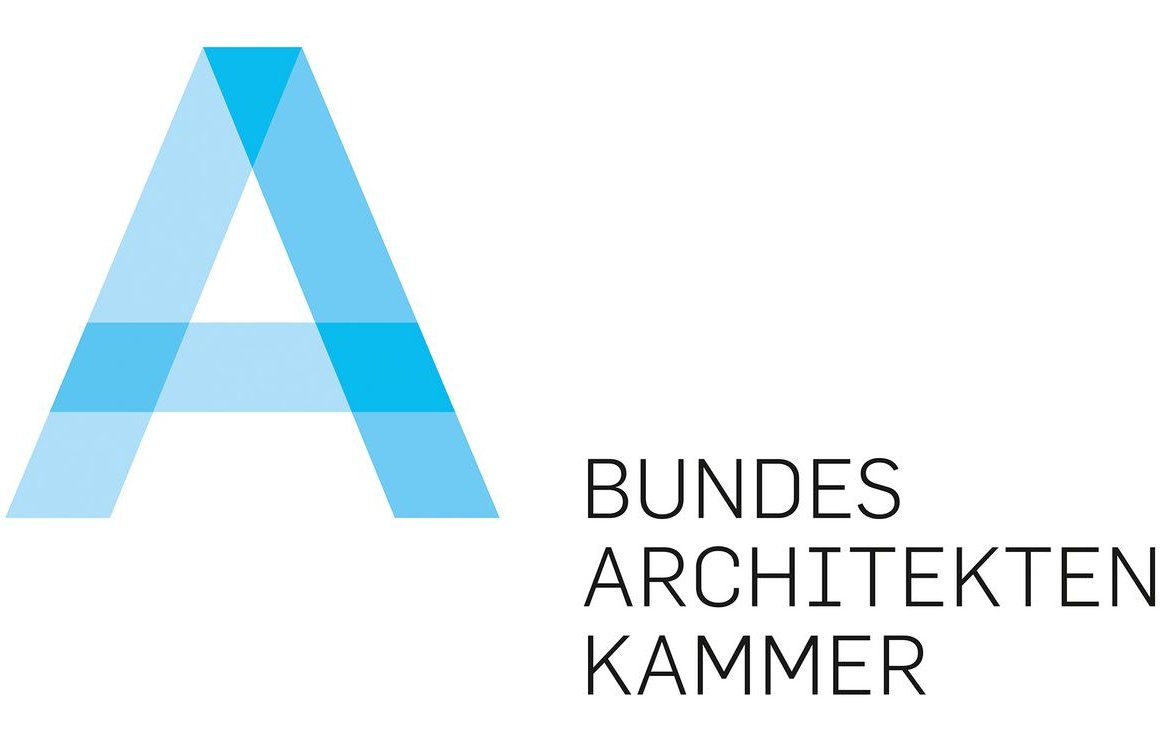 The Federal Chamber of Architects (BAK) and the Federal Foundation of Baukultur presented their proposal for a "Baukultur Innovation Programme" to politicians in Berlin today on behalf of the planning and construction industry.
Anne Katrin Bohle, State Secretary at the Federal Ministry of the Interior, Building and Community, accepted the four-point plan. In it, the authors suggest measures to overcome the coronavirus crisis that will have a lasting economic and social impact.
The Federal Chamber of Architects (BAK) and the Federal Foundation of Baukultur presented their proposal for a "Baukultur Innovation Programme" to politicians in Berlin today on behalf of the planning and construction industry.
Anne Katrin Bohle, State Secretary at the Federal Ministry of the Interior, Building and Community, accepted the four-point plan. In it, the authors suggest measures to overcome the coronavirus crisis that will have a lasting economic and social impact.
The federal government can give a short-term boost to public housing construction in Germany and thus help to ease the acute housing shortage in many large cities. The key to this is three federally owned companies that provide flexible support to the federal states and local authorities in the development of construction projects and the construction of new housing: Firstly, a consultancy company that provides planning capacities to cities and municipalities. Secondly, a land fund that provides financial and conceptual support to local authorities nationwide in acquiring building land and financing infrastructure. Thirdly, an investment company that strengthens the equity of municipal housing construction companies through financial participation. Prof Dr Sebastian Dullien, Scientific Director of the Institute for Macroeconomics and Economic Research (IMK) at the Hans Böckler Foundation, and Prof Dr Tom Krebs from the University of Mannheim show this in a new concept for a federal "Future Housing" initiative.
Climate protection has long been one of the most urgent topics for the housing industry. In order to achieve a climate-neutral building stock by 2050, the 24 founding companies of the Wohnen.2050 initiative met in Berlin on 28 January 2020 to found the association. The nationwide association was initiated by the Nassauische Heimstätte | Wohnstadt group of companies.
 "Don't just talk about climate change, act" - under this motto, the Nassauische Heimstätte | Wohnstadt Group invited founding partners from all over Germany to found the Initiative Wohnen.2050 (IW2050) association. The overarching objective is a climate policy alliance, which, in addition to strategic cooperation and a technical and content-related comparison, primarily focuses on economic and financial concerns to achieve the targets.
"Don't just talk about climate change, act" - under this motto, the Nassauische Heimstätte | Wohnstadt Group invited founding partners from all over Germany to found the Initiative Wohnen.2050 (IW2050) association. The overarching objective is a climate policy alliance, which, in addition to strategic cooperation and a technical and content-related comparison, primarily focuses on economic and financial concerns to achieve the targets.
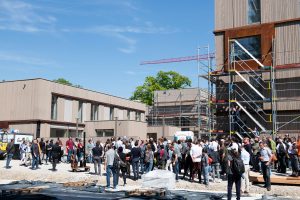 The Munich City Council's Committee for Urban Planning and Building Regulations has decided to promote the construction of new, contemporary timber construction projects. This year, the city council will develop a further subsidy programme for construction using wood and other renewable raw materials.
The grant programme is suitable for individual projects as well as larger housing estates and neighbourhoods. The aim of the city council is to ensure that around 50 per cent of the buildings on municipal land are constructed using timber.
The Munich City Council's Committee for Urban Planning and Building Regulations has decided to promote the construction of new, contemporary timber construction projects. This year, the city council will develop a further subsidy programme for construction using wood and other renewable raw materials.
The grant programme is suitable for individual projects as well as larger housing estates and neighbourhoods. The aim of the city council is to ensure that around 50 per cent of the buildings on municipal land are constructed using timber.
 Climate protection and socially just construction and housing must be considered together - Legal regulations in the rental housing sector and state subsidy practice undermine climate goals in the building sector - Deutsche Umwelthilfe and Deutscher Mieterbund present 10-point immediate programme for socially acceptable design of energy modernisation in existing and new buildings - KfW subsidy practice must be subjected to a reality check - Social provisions must be supplemented by climate policy requirements
Climate protection and socially just construction and housing must be considered together - Legal regulations in the rental housing sector and state subsidy practice undermine climate goals in the building sector - Deutsche Umwelthilfe and Deutscher Mieterbund present 10-point immediate programme for socially acceptable design of energy modernisation in existing and new buildings - KfW subsidy practice must be subjected to a reality check - Social provisions must be supplemented by climate policy requirements
Discrimination in multi-storey construction has been abolished: The Schleswig-Holstein State Building Code (LBO-SH) was amended by law on 1 October 2019. The amendments came into force at the end of October 2019. On the one hand, the amendment ends the disadvantage of timber construction in multi-storey construction and continues to create the conditions for additional living space under easier conditions. https://informationsdienst-holz.de/...
Almost €1 billion in federal funding for urban development and social integration in neighbourhoods in 2020 The federal and state governments have jointly developed a new structure for urban development funding from 2020: A total of €790 million will be available in three (instead of the previous six) concentrated urban development funding programmes. In addition to the funding requirement of climate change/climate adaptation, new [...]
Germany's largest cooperative housing project in Berlin 28:58 min Video available until: 12/02/2020 First broadcast on: 2.12.2019 Living in the metropolis, in a large community, according to its own rules. Central, energy-saving, ecological, cosmopolitan, inclusive. The residents of Möckernkiez in Berlin-Kreuzberg have fulfilled this dream.
Senate adopts concrete measures for the next ten years and sets new CO2-targets for 2030 and 2050
24 October 2019 Strengthen energy refurbishment of buildings and demand responsibility from landlords. Housing policy must create supportive framework conditions and thus contribute to the reduction of living space. "For a necessary energy turnaround in the housing industry, conditions must be created that demonstrate tangible incentives for owners and users to consume less energy in the future," [...]
With the timber construction funding program, the city wants to promote concrete timber buildings, especially in residential construction Timber Construction Guide presents 29 realized and forward-looking timber construction projects in Freiburg More climate protection with the renewable raw material wood. Timber construction in Freiburg is an important instrument for climate protection and indispensable for achieving the city's ambitious climate protection goals. […]
Cooperation between Stadtwerke and berlinovo for largest German tenant power project Mietersonne Kaulsdorf, the largest German tenant power project with a capacity of almost 3.4 megawatts (MW), is being built by Berliner Stadtwerke for the Berlin housing association berlinovo in Marzahn-Hellersdorf. Tenants of 4,300 apartments will be able to benefit from the green electricity generated directly on their roofs.
The Timber Construction Award 2020 Building with Wood in Schleswig-Holstein and Hamburg honours realised buildings that are predominantly constructed from wood and wood-based materials as well as other renewable raw materials. The primary objective is to promote the use and further development of this resource-saving, environmentally friendly and sustainable building material. The buildings to be submitted should be of high design quality [...].
From the meeting of the Berlin Senate on 24 September 2019: At its meeting today, the Senate adopted the report to the House of Representatives on "Sustainability in construction: Berlin builds with wood", following a presentation by the Senator for the Environment, Transport and Climate Protection, Regine Günther. The Senate is consistently pursuing the goal of making Berlin [...]






